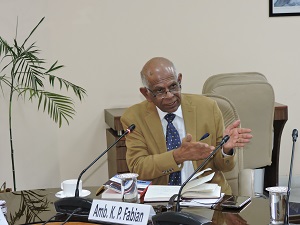The Vivekananda International Foundation organized a book discussion on 18 November on book titled, “The Arab Spring That Was and Wasn’t” authored by Amb. K P Fabian and published by Macmillan Education in June 2022. The discussion was attended by Amb. Anil Trigunayat (Coordinator); Amb.D P Srivastava; Lt. Gen. Gautam Banerjee; Lt. Gen. R K Sawhney and Dr. Arvind Gupta, Director, VIF.
The book divided into 28 chapters has analyzed the multiple facets of the Arab Spring protests that swept the region in 2010-2011. In case of Tunisia, the author touched upon the background of the Arab Spring calling it as an adventitious revolution that coincided with the missteps by Zine El Abidine Ben Ali. Tunisia after initial success faced setback in the democratization process. In Egypt, the west preferred the status quo under Hosni Mubarak and hoped that his regime could avert the storm. The western calculation proved wrong and the military while protecting its interests withdrew support from Mubarak. The military entered into tacit agreement with Muslim Brotherhood during the transition period. The Supreme Council of Armed Forces (SCAF) however deposed Muslim Brotherhood led government under Mohammad Morsi and regained direct political control. The Western powers after losing their allies in Tunisia and Egypt, sought to capitalize from the wave of Arab Spring by removing Muammar Gaddafi from Libya and Bashar Al Assad in Syria. The crises in Libya and Syria were driven by regional actors specifically the UAE; Qatar; Saudi Arabia and Turkey and extra-regional players i.e. the US, Britain and France. In Libya, the post-Gaddafi period is marked by intense political turmoil and civil war. In Syria, the US as well the Gulf States intended to create rift within the ruling elite and supported rebels against the Bashar Al Assad government. The western plot to topple Assad regime was thwarted by Russia, Iran and Hezbollah. The missteps by the US and other western powers in the region has aggravated instability and perpetuated radicalization. The US military action radicalized a large number of Muslim youth and in fact, the controversial Abu Ghraib prison in Iraq emerged as the breeding and recruiting ground for the Islamic State (IS). The author noted that Israel as consequence of the Arab Spring has made deep strategic gains facilitating in the signing of the Abraham Accords with key Arab states.
In light of the Arab Spring protests and subsequent unrests in different states, India’s primary concerns were the safety of the diaspora community. It also impacted India’s trade and investments in the region.







Post new comment